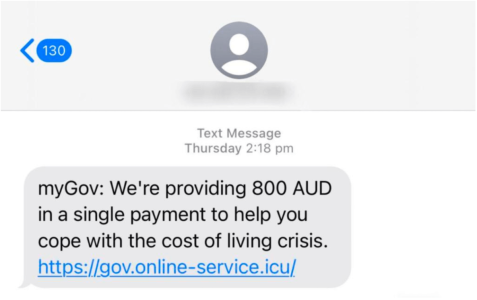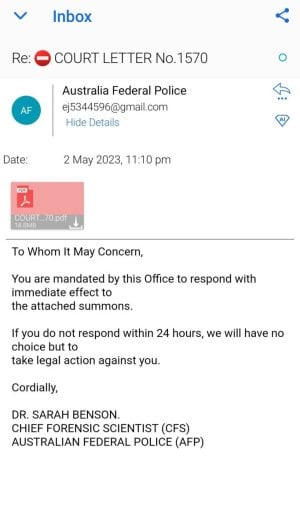Beware of myGov scammers: Aussie couple loses $150,000 while on holiday
- Replies 15
Dreaming of a much-needed break from the daily hustle and bustle? Bali might just be the perfect antidote for Australians seeking to unwind and indulge in delicious food, stunning views, and some much-needed vitamin D.
But beware, paradise comes with its own set of hidden dangers. Recently, a Melbourne couple had a shocking encounter with the darker side of travel.
While on holiday in Bali, Anna De Rieu and her partner fell prey to a whopping $150,000 scam, leaving them in disbelief and financial ruin. What had started as a carefree holiday quickly turned into a nightmare when the couple's belongings were stolen.
However, that was just the beginning of their ordeal. Apparently, the crafty thieves used their personal information to hack into their myGov accounts, causing unimaginable chaos.

It may seem unbelievable, but the hackers who targeted Anna De Rieu and her partner managed to pull off a shocking heist. By gaining access to the couple's myGov account, which provides access to crucial Australian government services such as Centrelink, the Australian Taxation Office, and Medicare, the criminals were able to withdraw an eye-watering $150,000 in government support payments.
Ms De Rieu only became aware of the theft when she attempted to log into her account and found that it had been blocked. The shocking truth soon emerged: her personal details had been changed multiple times, and the money was being continuously drained from their account.
It took six gruelling months for Ms De Rieu and her partner to finally resolve the situation, during which time they were left helpless and vulnerable. Understandably, the experience has left them shaken and fearful about the possibility of future hacking incidents.
The impact of these scammers goes far beyond the ordeal experienced by Anna De Rieu and her partner. Numerous families have fallen victim to these devious criminals, who prey on innocent Australians by accessing and changing their personal and tax information on myGov accounts.
Ms De Rieu has since revealed to the media that the scammers fraudulently claimed payments from a wide range of sources, including pandemic relief, flood relief, and even JobSeeker payments.
To add insult to injury, the scammers would repeatedly change the couple's address every time they made a new claim, making it even harder for them to catch and stop the fraud.
Unfortunately, Anna De Rieu and her partner's ordeal is just one of many stories of Australians falling prey to cybercriminals. Leah Wilson, another Melbourne woman, also suffered a financial blow when fraudsters lodged fraudulent tax returns in her name, resulting in a whopping $27,000 tax bill.
Wilson was alerted to the scam when she noticed through myGov that three different organisations had claimed she was working for them, even though she wasn't. Trying to prove her innocence and convince the tax office that the returns were fraudulent was a long and stressful process, leaving her feeling anxious and overwhelmed.

The reality is that cybercrime is a growing problem, and we must all take steps to protect ourselves against it. By keeping our personal information and belongings safe, using strong and unique passwords, and being vigilant about suspicious activity, we can reduce the risk of falling victim to these crimes.
And if we do find ourselves in a situation like Ms De Rieu or Ms Wilson, it's important to act quickly and seek help from the relevant authorities to minimise the damage.
Australians have been warned to be extra vigilant against scam emails or texts pretending to be from myGov. There has been a recent surge in fraudulent messages, with scammers posing as government officials and urging recipients to click on suspicious links to claim a refund or rebate.
Services Australia has urged anyone who has received a message claiming that their myGov account has been changed in any way to consider it a scam. The fake text message or the email may ask users to click on a link or access a web form, which could redirect them to a fake myGov site designed to steal personal information and banking details.
The scammers use a range of tactics to gain the trust of their victims, such as telling them that their information is being transferred securely. One example of a scam text reads: 'Your profile security information was successfully changed if you didn't make this change Go To [link].' Another message informs the user that their 'profile has been placed on hold pending review' and provides a link to 'resolve' the issue.
To stay safe, Services Australia recommends that users only log into their myGov account by searching my.gov.au on a web browser and never clicking on links attached to an email or text message.
It's important to remain cautious and double-check the legitimacy of any message before clicking on any links or providing personal information.
According to Scamwatch, fraudsters are becoming increasingly sophisticated in their tactics, using clever methods to steal sensitive data such as usernames, passwords, and financial information.
If you receive a text or email claiming to be from myGov, it's essential to be cautious. Look out for poor grammar or spelling mistakes, and remember that myGov will never include hyperlinks in their communications. If in doubt, do not click on any links and, instead, go directly to the myGov website by typing the address into your web browser.
It's also important to know that emails from myGov will not include the agency's logo; instead, they will only inform you that you have received a new message in your inbox. If you have any concerns about a message you have received, it's best to err on the side of caution and contact the Services Australia Scams and Identity Theft Help Desk immediately.
By staying alert and taking steps to protect your personal information, you can help to keep yourself and your loved ones safe from cybercriminals.

This serves as a stark reminder that while we're packing sunscreen and mosquito repellent in our suitcases, we must also take the time to ensure our online accounts are secure before we jet off.
Remember, knowledge is power, and being aware of the risks can help you better protect yourself and your hard-earned dollars.
Have you ever received a suspicious email or text message claiming to be someone else? What steps do you take to protect your personal information online, especially when it comes to government services like myGov?
Share your thoughts with us in the comments!
But beware, paradise comes with its own set of hidden dangers. Recently, a Melbourne couple had a shocking encounter with the darker side of travel.
While on holiday in Bali, Anna De Rieu and her partner fell prey to a whopping $150,000 scam, leaving them in disbelief and financial ruin. What had started as a carefree holiday quickly turned into a nightmare when the couple's belongings were stolen.
However, that was just the beginning of their ordeal. Apparently, the crafty thieves used their personal information to hack into their myGov accounts, causing unimaginable chaos.

An Australian mum and her husband were robbed while on holiday and subsequently hit with a $150,000 scam using their myGov account. Credit: Unsplash/Jenny Ueberburg.
It may seem unbelievable, but the hackers who targeted Anna De Rieu and her partner managed to pull off a shocking heist. By gaining access to the couple's myGov account, which provides access to crucial Australian government services such as Centrelink, the Australian Taxation Office, and Medicare, the criminals were able to withdraw an eye-watering $150,000 in government support payments.
Ms De Rieu only became aware of the theft when she attempted to log into her account and found that it had been blocked. The shocking truth soon emerged: her personal details had been changed multiple times, and the money was being continuously drained from their account.
It took six gruelling months for Ms De Rieu and her partner to finally resolve the situation, during which time they were left helpless and vulnerable. Understandably, the experience has left them shaken and fearful about the possibility of future hacking incidents.
The impact of these scammers goes far beyond the ordeal experienced by Anna De Rieu and her partner. Numerous families have fallen victim to these devious criminals, who prey on innocent Australians by accessing and changing their personal and tax information on myGov accounts.
Ms De Rieu has since revealed to the media that the scammers fraudulently claimed payments from a wide range of sources, including pandemic relief, flood relief, and even JobSeeker payments.
To add insult to injury, the scammers would repeatedly change the couple's address every time they made a new claim, making it even harder for them to catch and stop the fraud.
Unfortunately, Anna De Rieu and her partner's ordeal is just one of many stories of Australians falling prey to cybercriminals. Leah Wilson, another Melbourne woman, also suffered a financial blow when fraudsters lodged fraudulent tax returns in her name, resulting in a whopping $27,000 tax bill.
Wilson was alerted to the scam when she noticed through myGov that three different organisations had claimed she was working for them, even though she wasn't. Trying to prove her innocence and convince the tax office that the returns were fraudulent was a long and stressful process, leaving her feeling anxious and overwhelmed.

Australians are being warned about scammers targeting vulnerable people amid the rising cost of living. Credit: Reddit.
The reality is that cybercrime is a growing problem, and we must all take steps to protect ourselves against it. By keeping our personal information and belongings safe, using strong and unique passwords, and being vigilant about suspicious activity, we can reduce the risk of falling victim to these crimes.
And if we do find ourselves in a situation like Ms De Rieu or Ms Wilson, it's important to act quickly and seek help from the relevant authorities to minimise the damage.
Australians have been warned to be extra vigilant against scam emails or texts pretending to be from myGov. There has been a recent surge in fraudulent messages, with scammers posing as government officials and urging recipients to click on suspicious links to claim a refund or rebate.
Services Australia has urged anyone who has received a message claiming that their myGov account has been changed in any way to consider it a scam. The fake text message or the email may ask users to click on a link or access a web form, which could redirect them to a fake myGov site designed to steal personal information and banking details.
The scammers use a range of tactics to gain the trust of their victims, such as telling them that their information is being transferred securely. One example of a scam text reads: 'Your profile security information was successfully changed if you didn't make this change Go To [link].' Another message informs the user that their 'profile has been placed on hold pending review' and provides a link to 'resolve' the issue.
To stay safe, Services Australia recommends that users only log into their myGov account by searching my.gov.au on a web browser and never clicking on links attached to an email or text message.
It's important to remain cautious and double-check the legitimacy of any message before clicking on any links or providing personal information.
According to Scamwatch, fraudsters are becoming increasingly sophisticated in their tactics, using clever methods to steal sensitive data such as usernames, passwords, and financial information.
If you receive a text or email claiming to be from myGov, it's essential to be cautious. Look out for poor grammar or spelling mistakes, and remember that myGov will never include hyperlinks in their communications. If in doubt, do not click on any links and, instead, go directly to the myGov website by typing the address into your web browser.
It's also important to know that emails from myGov will not include the agency's logo; instead, they will only inform you that you have received a new message in your inbox. If you have any concerns about a message you have received, it's best to err on the side of caution and contact the Services Australia Scams and Identity Theft Help Desk immediately.
By staying alert and taking steps to protect your personal information, you can help to keep yourself and your loved ones safe from cybercriminals.
Key Takeaways
- Australians are falling prey to cybercriminals who use their stolen information to hack into their myGov accounts and claim government support payments.
- In one instance, a couple was scammed out of $150,000, while another woman received a $27,000 tax bill due to fraudulent claims made in her name.
- Scammers are also using fake myGov messages to trick Australians into clicking on malicious links, stealing their personal information, and accessing their accounts.
This serves as a stark reminder that while we're packing sunscreen and mosquito repellent in our suitcases, we must also take the time to ensure our online accounts are secure before we jet off.
Remember, knowledge is power, and being aware of the risks can help you better protect yourself and your hard-earned dollars.
Have you ever received a suspicious email or text message claiming to be someone else? What steps do you take to protect your personal information online, especially when it comes to government services like myGov?
Share your thoughts with us in the comments!








